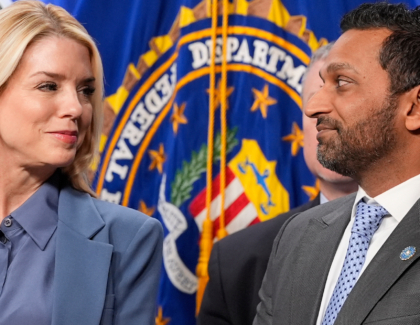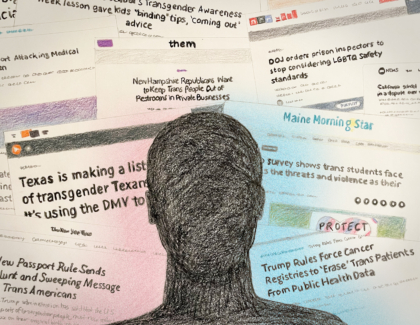Sign up for the daily CJR newsletter.
In a midterm election season that is increasingly debased, with Michael J. Fox’s tremors and a bare-shouldered blond from Tennessee stealing center stage from, say, Iraq or North Korea, we welcomed two lengthy A1 profiles in the Washington Post of George Allen and James Webb, who are in a sensational and keenly contested race to be the junior senator from Virginia.
To our great disappointment, though, a chance to dig us out from all the mud that has been slung in this race (the freshest pile coming today in the form of salacious excerpts from Webb’s novels publicized by the Allen camp) was lost. Rather than tell us something substantive — or at least new — about the two men, the articles redundantly whittle down their two biographies until they are the thinnest of cardboard cutouts: the racist vs. the misogynist.
The Allen profile appeared yesterday and, for the most part, simply rehashed the accusations of N-word usage and deer-head stuffage that former friends and classmates have been making for weeks now. The central question the story proposed to explore was this: “‘Macaca’ raises a question: Has Allen really evolved, or did his true nature slip into public view?”
Granted, no one would claim that it’s irrelevant if a candidate is a racist. But a profile that promised to give us the whole truth about the senator instead stretched itself to absurdity to try to make a point about his psychology. The nadir of that stretch was this blockbuster scoop: George Allen stole someone’s bike in high school. “George Allen was a big bully,” one of his old school chums whines. Even on the supposedly central question of Allen’s attitudes toward black people, the article does not move beyond a clip job. A few other anecdotes are used to mitigate the criticisms–as if the absurd notion that his three trips to historic sites in the south where 1960s civil rights battles took place, while “Eyes on the Prize” played on the bus’s television set, somehow make him well-rounded. More convincing is the news that he co-sponsored a resolution apologizing to lynching victims and their descendants, and a proposal to allocate a half-billion dollars to historically black colleges.
But there is almost nothing in here about how George Allen governs, what kind of senator he has been, how he voted, why he ardently supports the president. Nothing. When we came across the lone paragraph of substance — telling us that as governor Allen abolished the state’s parole system, pushed through changes in welfare and education policy, and championed parental notification for minors seeking abortion — we fell upon it like flies on macaca.
The Webb article is not much better. If the Allen piece is about why this man’s psyche is so warped with hate, the question asked about Webb is, why does he despise women so damn much? Again, we hear about the controversial Washingtonian article from the 70s in which he wrote, “no benefit to anyone can come from women serving in combat.”
In the Allen piece it’s pure pop psychology that’s used to explain the rage hiding beneath his surface, the “darkness on the edges of the world of privilege and glamour.” Mostly, his daddy didn’t love him enough (the article even quotes an interview with George Allen, Sr. in which the legendary football coach says, “If a man is going to succeed in anything, he must neglect everything else, whether it is his wife, his children or himself”). The Webb profile, too, draws on its pocket Freud to analyze the Vietnam vet: “Battle was so terrible and so profound that Webb says he believed only a certain temperament could survive there — and only men had it.”
As in the Allen piece, we hear nothing about Webb’s record or his policy positions. He was secretary of the Navy for about a year and then spent three years working at the Pentagon. What can we learn about him from this time? How did he manage people, what did his employees and employers think of him? Zip. All we are given is a lame anecdote about how Webb punched a colonel on the arm during a ceremony to show his solidarity with the grunts in the audience.
As we’ve mentioned before, there is so much to debate just now in this country, and almost nowhere do we have such a stark difference of opinion on many of the fundamental issues as in this Virginia Senate race. These two candidates represent different worldviews. To write three-thousand-word profiles about them without even once mentioning their respective views on Iraq and what they envision as the way forward, to not venture into important territory–their ideas on the economy, health care, the environment–is to abscond on a journalistic responsibility to readers. We are not asking for civic journalism here. Just please take us more than a few substantial steps beyond Drudge.
Sadly, we’ve become accustomed to the idea that in television, putting a candidate’s character on the couch has become the predominant approach to political races. Character is not irrelevant, but a crucial strength of a newspaper is the ability to delve beneath these cartoonish appraisals. The Washington Post can, and often does, flex this muscle to great effect, but with these two profiles it missed a chance to make us smarter about the race and the candidates.
Has America ever needed a media defender more than now? Help us by joining CJR today.






